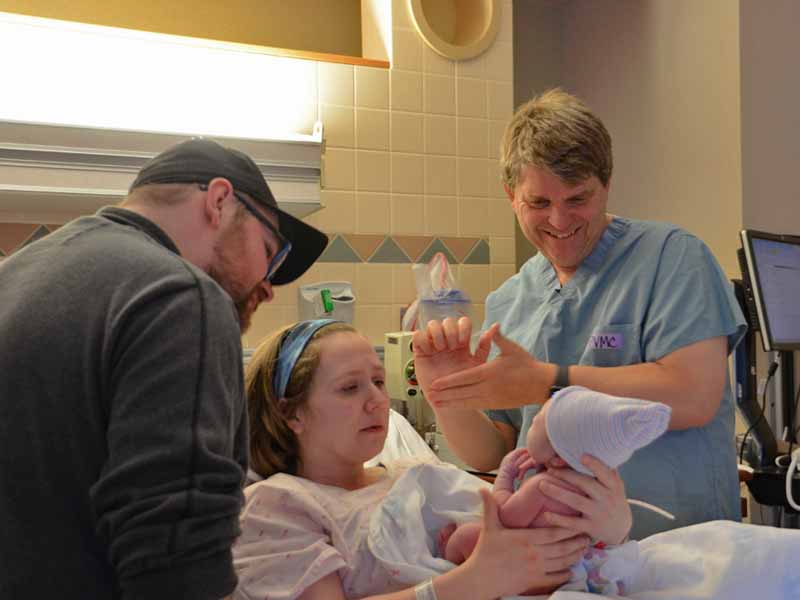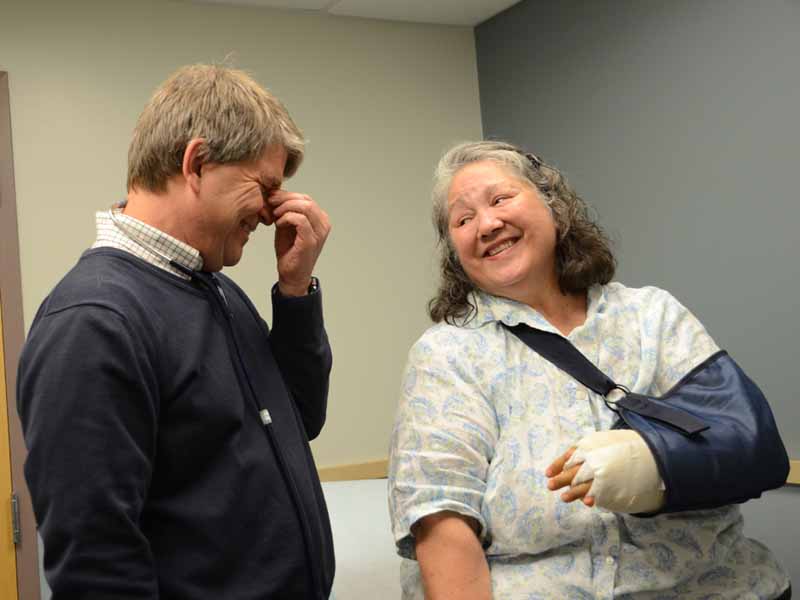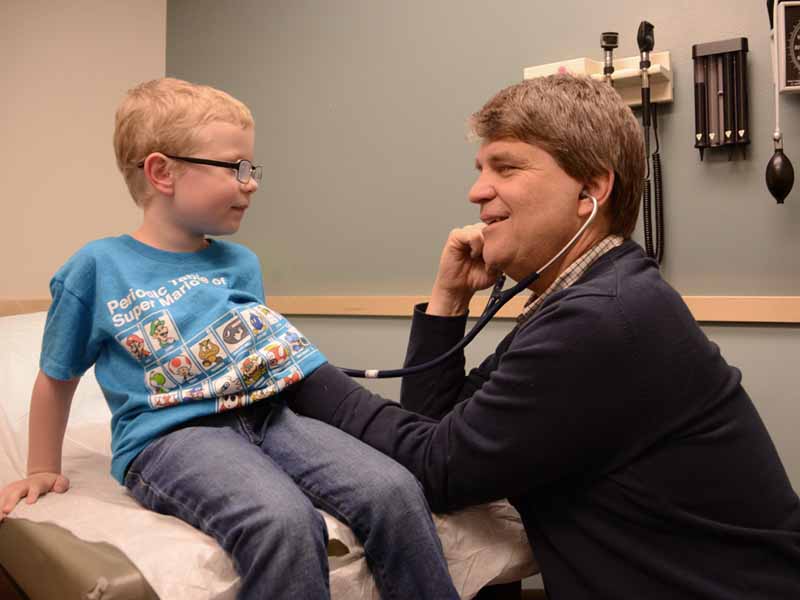Q&A With John Cullen, M.D.
Frontier Medicine Honed AAFP President's Leadership Skills
October 10, 2018, 02:32 pm Sheri Porter – The AAFP's newly installed president, John Cullen, M.D., of Valdez, Alaska, definitely has bragging rights when it comes to practicing frontier medicine in a remote rural location most Americans will never see. His town of fewer than 4,000 full-time residents sits on the northeast tip of Prince William Sound, surrounded by mountains that are often covered in snow and featuring terrain -- and extreme weather conditions -- that are not for the faint of heart.
AAFP News spent a few days with Cullen and his three practice partners in May and quickly learned just how much their community relies on the practice for its health care needs. The town's only four physicians provide, among other things, routine preventive care; chronic care management; procedures such as colonoscopies, endoscopies and ultrasounds; and obstetrical services, including caesarean deliveries when necessary. Oh, and throw in some life-threatening emergencies that require airlift evacuations in horrific weather conditions.
In short, Cullen's practice exemplifies the kind of family medicine most young physicians yearn for when they first enter the specialty.
Cullen spent time with AAFP News in a conversation that ranged from his family to some of the most pressing issues family medicine will face in the next 12 months.
Q. What do small, rural family medicine practices need from the AAFP?

John Cullen, M.D., can't help but smile moments after a delivering a healthy baby as Robert and Elizabeth Covington get to know their new daughter, Morgaux.
A. Practices like mine need the same things that all family medicine practices need: relief from administrative burden, appropriate payment for what we do and functional EHRs (electronic health records). In addition, we need well-trained new physicians who can handle the broad scope of practice in rural communities. This will require getting medical students excited about the possibilities that exist for them if they choose a career in family medicine.
There also is work ahead in creating more residency slots to facilitate training those new young physicians in full-scope family medicine.

Sharing a light moment with a longtime patient is one of the perks of family medicine that John Cullen, M.D., enjoys after 24 years of practice in Valdez, Alaska.
Q. Every year, you host medical students and residents in your practice and your home for extended stays so they can experience frontier medicine. Why are you so committed to precepting?
A. When I first came to Valdez, the plan was to go back and teach in residency, but my family just never left. I love teaching because it reminds me of how important and special my work here is. One of the things we provide our visiting medical students is a little bit of an inoculation against the toxic environment of medical schools, because they're really awful at promoting family medicine. When residents and students come in, they educate us about what they're learning, which keeps us up to date. And they just ask the damnedest questions!
It's nice to have an impact on the future of medicine.
Q. What questions have you heard from members as you travel around the country meeting family physicians?
A. Members have a lot of concerns about the American Board of Family Medicine's (ABFM's) Maintenance of Certification for Family Physicians and how the Academy plans to make changes that will benefit family physicians. I always point out that the ABFM and the AAFP are separate organizations without common governance.
Family physicians also have lots of questions about administrative simplification and what the Academy is doing to lessen that burden on their practices.
Q. What is one thing that family physicians don't understand about their AAFP?
A. The most common misconception I've found is that many members do not realize the AAFP is a member-run organization whose elected leaders are practicing family physicians chosen by members to represent them.
Q. Is there a hot-button issue related to family medicine and health care that keeps you awake at night?
A. I worry about our scope of practice and that we are losing the breadth of care that makes family medicine unique among all of the medical specialties.
I also worry about the cost of health care in our country, which currently consumes nearly 18 percent of the U.S. gross domestic product (GDP). Unless there is significant change, CMS predicts that health care will consume 20 percent of GDP by 2025. At some point our current system will collapse, as it simply is not sustainable.
Q. Why did you want to be the AAFP president?

Corbin Kilian gets a little face time with his family physician, John Cullen, M.D., during a well-child exam.
A. Early in my career, I went through a difficult time in my community. There were politics and a difficult work situation that taxed my resolve to continue. My involvement in my state academy and the AAFP became a real source of strength as I navigated that difficult time in my life. I learned a lot from the AAFP, and now it is my time to help other family docs.
Q. What do you see as your greatest strength as you step into the AAFP's highest elected office?
A. For the last 24 years I have been practicing in a beautiful but remote area of Alaska. My partners and I have found that family medicine is the only specialty that can thrive in this type of environment. We practice full-scope family medicine, including emergency medicine and obstetrics, and I have a wealth of stories that can illustrate the importance of family medicine. Practicing rural/frontier family medicine gives me confidence that I can handle anything that affects our specialty. It takes a lot to get me rattled.
Q. What is it about family medicine that keeps you motivated every day?
A. What I have loved most in my career is delivering babies and watching them grow up. I am on my second generation of children, which makes me a "granddoctor" of sorts. I also enjoy caring for an entire community; I'm helping my friends and neighbors.
Q. How will you deal with the inevitable "patient separation" during your presidential year?
A. With great difficulty.
Q. Is there a volatile topic that you anticipate will arise during your tenure?
A. This is a contentious time, and I foresee many issues hotly debated over the next year, including reproductive rights, health equity and how to maintain vibrant independent practices. It is necessary for our patients' health, and the health of our country, that we support each other and learn to bridge differences in opinion among family physicians. We have much in common, and we need to speak with one voice.
Q. What do you do in your free time?
A. My community has some of the best sailing and skiing in the world. We sail until we can ski, then ski until we can sail. Hiking, shrimping, fishing and kayaking are also popular activities. Music is another down-time activity for me, especially playing one of my several guitars.
Q. Will you share something special about your family?
A. My three children grew up living a life of adventure that they thought was commonplace. My family also shares an affinity for science fiction, fantasy and other genres, and we have spent many lively hours around the dinner table discussing literature and films. So I offer full disclosure when I say that although I am a physician from Alaska and my family's name is Cullen, we are not vampires, had nothing to do with Twilight and like the sun just fine.
Related AAFP News Coverage
2018 Congress of Delegates
AAFP Delegates Choose New Leaders for 2018-19
(10/10/2018)
2018 Congress of Delegates
COD Addresses Medical Aid in Dying, Institutional Racism
(10/10/2018)
2018 Family Medicine Experience
FPs Make a Difference Volunteering in 'The Big Easy'
(10/10/2018)
2018 Congress of Delegates
Payment Tops FPs' Agenda at Town Hall
(10/8/2018)
Loving Frontier Medicine
Family Physicians Earn Respect in Remote Valdez, Alaska
(6/6/2018)
Additional Resources
2018 Congress of Delegates: Day Two
2018 Congress of Delegates: Day One